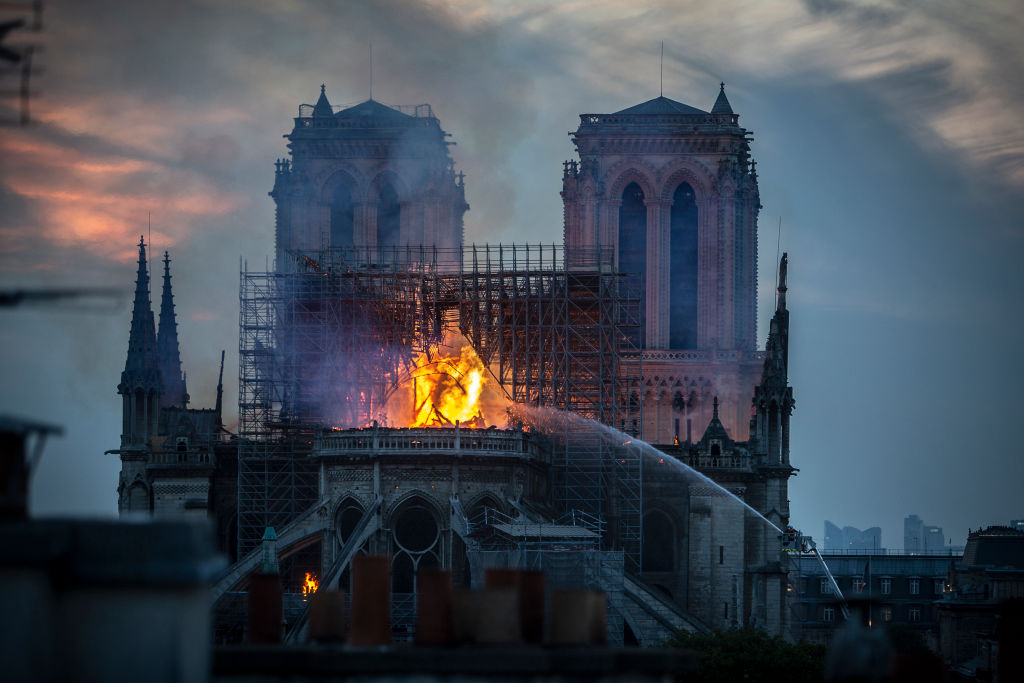By Michelle Powers and Claire Giangrave

PARIS, France – One thing was clear when Currents News traveled to Paris to report on the aftermath of the Notre Dame Cathedral fire; it was a great loss, but all wasn’t lost. Holy Week and Easter continued as they always do, yet this year, many believers said things just ‘felt different.’
“People here are very discreet about religion and even more when it comes to politics,” said a woman named Silvia. Another person, a man named Jean Paul, said the blaze caused a ‘deep sorrow’ around the country.
“We have cried, but we have also prayed,” he said. “I have seen a lot of people pray at this time, not just for the cathedral, but for the Church in general.”
Believers remarked that unlike typical Masses across the country on any given holy day, churches this Easter were filled to capacity after the fire, with people spilling out onto steps and into courtyards.
After leading a procession of hundreds on Good Friday, Bishop Matthieu Marie Jean Rougé of Nanterre, a neighboring diocese just outside of Paris, was happy to see young people joining in at every station.
“All people have been moved by Notre Dame and want to meet other believers and be with other people to share some sort of event,” he explained.
‘Spiritual Reawakening’
Once among the most Catholic countries in the world, in recent years France has seen a serious decline in churchgoing numbers. While more than 50 percent of people still identify as Catholic, only five percent regularly attend Mass.
“In France, if you live in France, you are in some way related to the Catholic Church,” said Bishop Rougé in an exclusive interview.
“But many just ignore it.”
The Bishop speculates that the Notre Dame fire just may ignite a spiritual reawakening of sorts, but he warns that any reawakening is a “long adventure.”
Zombie Catholics
Around France there is much speculation that the emotions in the aftermath of the fire may join forces with another phenomena already underway across the secular country – the rise of “Zombie Catholics.”
Sociologists coined the term for people in France who do not attend church, but voters who turn out in droves to support leaders backing Catholic social policies.
For example, during the 2017 French election, François Fillon seemed on course to win the election before a scandal ultimately brought him down.
In other countries, this may not seem so unique, but secularism and separation between church and state is at the very core of the French government. Bishop Rougé describes the French government and church relations as “paradoxical.”
‘Tough Secularism’
“We speak a lot together and every chief of state has to know that this is a deeply rooted Catholic country, but at the same moment, he or she has to promote tough secularism,” he explained.
The rebuilding of Notre Dame, he hoped, will witness these awkward relations unfold.
Young Catholics have been the most receptive so far to the call to action that the sight of the burning Notre Dame inspired. Groups of youth have emerged at the grass-roots level, like the “Batisseur,” the builders, who are banding together to look for way to save the cathedral.
Unashamed of the Faith
“With the big marches for life of 2014, young people have realized that we cannot rely on the state anymore or institutions like my grandparents and parents,” Jacob said, adding that for the past 30 years Catholics were accustomed to keeping their faith away from the public eye.
“We should be more unashamed and obvious, or at least more vocal about what we do,” he said.
An exclusive survey on youth and religion carried out by OpinionWay for La Croix, an independent Catholic daily news source, found that the younger generation in France is discernibly more religious than the generation of their parents.
According to the data, it appears young people between the ages of 18 and 30 account for the largest number of believers in the French population as a whole.
Jacob added that many young people watched helplessly as firefighters rushed in to save the cathedral and asked themselves how they could use their talents to help save Notre Dame, wondering if “God is sending us a signal to go deeper and deeper in the mystery of death and the resurrection.”
“Maybe we are all called to become builders of cathedrals,” he said.
